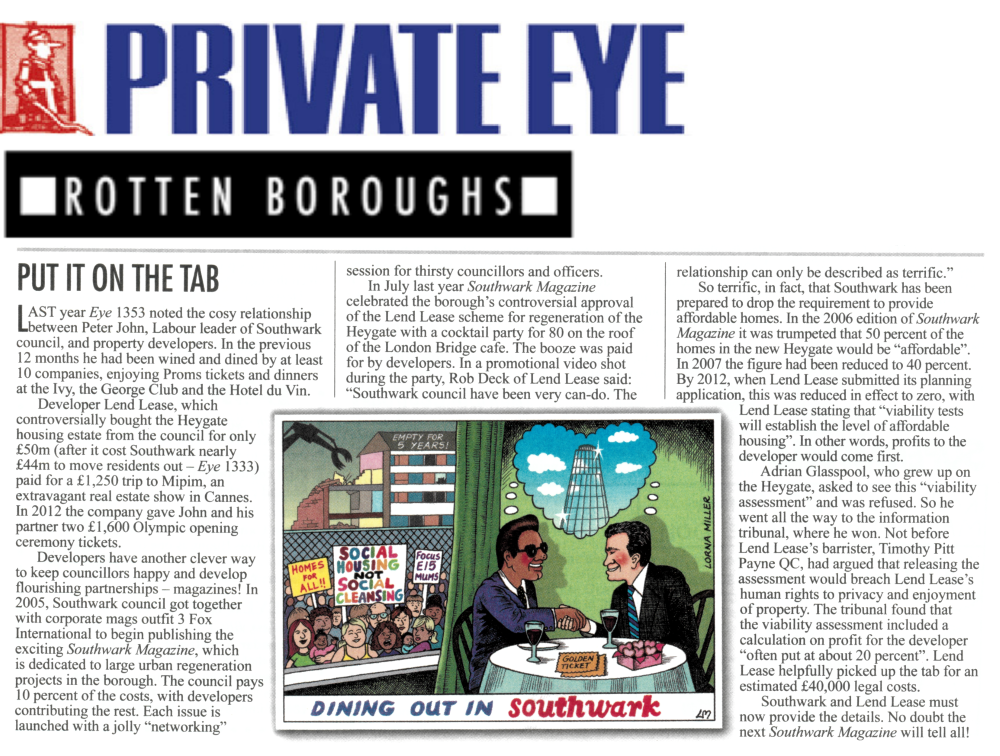
Former Southwark Council leader Peter John OBE has joined the long list of councillors and ex-council staff now working for property developers. Cllr John led Southwark from 2010 to 2020, and was chair of London Councils from 2018 to 2020.
Cllr John was recently appointed Chairman of the Terrapin Group, a lobbying firm, whose client list is dominated by property developers and real-estate investors. Cllr John joins three other serving councillors, from different boroughs, as a Terrapin 'practitioner', but in the more senior chairman's role.

Terrapin was founded by former Tory politician Peter Bingle in 2012 and has acquired a reputation for lobbying local government politicians to help developers get planning consents.
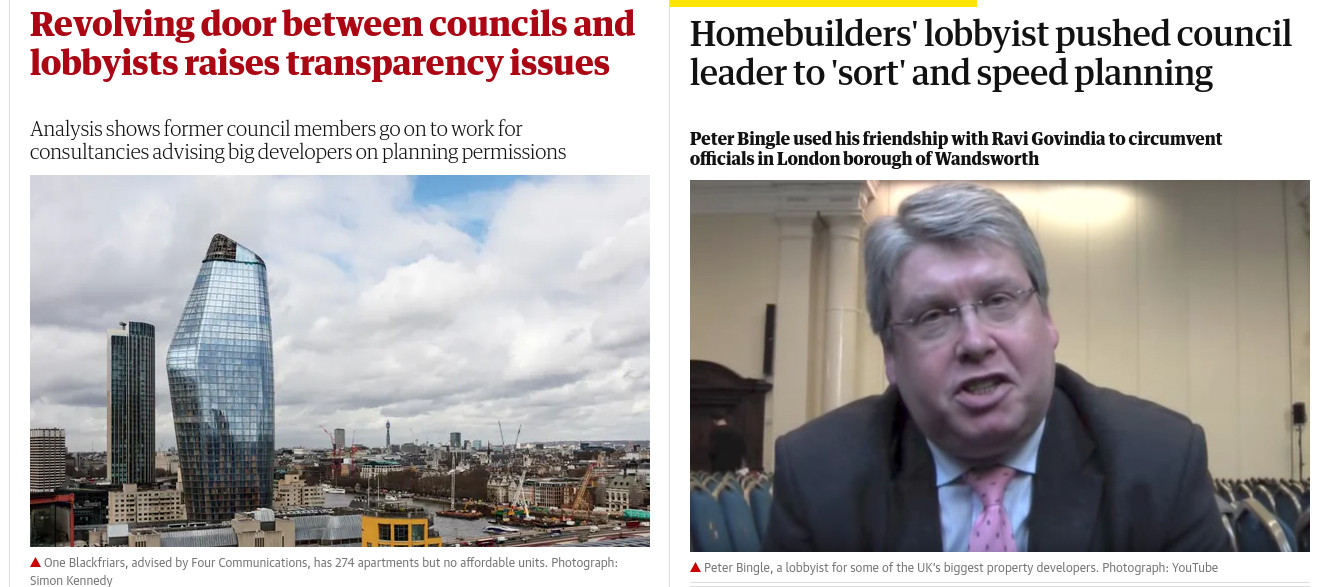
The Public Affairs Board Register shows Elephant & Castle developer Delancey is one of Terrapin's oldest clients, having benefited from their consultancy services since 2013. The Elephant Park (formerly Heygate estate) developer Lendlease was also on Terrapin's books for 4 years, from 2013 to 2017.
Other Terrapin clients with schemes in Southwark include Barratt Homes (from 2013 to 2017; Blackfriars Circus, Maple Quays, the Galleria, Redwood Park); Telford Homes (from 2019; Bermondsey Works), Hollybrook Homes Ltd (2018 - 2020; Eagle Wharf) and Bellway Homes (from 2013; Elmington estate regeneration, Phase 3).
The biggest developer in the Old Kent Rd Opportunity Area, Avanton Ltd, was also a Terrapin client from 2017 to 2019. Avanton is behind the approved Ruby Triangle development and the upcoming Gasworks and Carpetright schemes, which together will have over 2,100 homes. Ruby Triangle Properties Ltd was also on Terrapin's books, from 2017 to 2019, as was its affordable housing partner A2 Dominion, for different periods.
Other developers with smaller schemes in Southwark, who are or have been registered with Terrapin include Higgins Homes plc (Cherry Garden School); Southern Grove, who are looking to develop two sites (the 'Brooklyn', near Rotherhithe tunnel, and the St James, Bermondsey) and Pocket Living (Varcoe Rd and Credon House).
Peter John's relationship with Terrapin's Peter Bingle spans most of the years of his leadership at Southwark. The Council's Register of Interests shows a number of dinners paid for by Terrapin, Bingle himself or his previous company - the disgraced Bell Pottinger.

The announcement of Cllr John's appointment as Terrapin chair gives us an opportunity to look back at some of the controversial schemes signed off during his 10 years as Council leader.
Heygate estate redevelopment
In July 2010, just months after taking the reins at Southwark, Peter John signed a development agreement with Lendlease for the demolition of the 1,200 homes of the Heygate estate and its replacement by a private development with only 25% affordable housing - 10% less than Southwark's policy requirement - and with a minimum of social rented housing. In the event, Lendlease has built nearly 3,000 homes on the site, with just 100 at social rent.
It emerged that the deal involved a payment to the Council of just £50m for the 25 acre site - barely enough to cover the cost incurred by the Council in emptying the estate.
Later, in 2012 and 2014 Cllr John came under fire for accepting tickets to the London Olympics, paid for by Lendlease and for making a trip to Cannes, to attend the MIPIM developer jamboree.

Aylesbury estate redevelopment
In 2014, Peter John signed-off the sale of the 2,759 council homes and 60 acres of land of the Aylesbury estate for demolition and redevelopment to housing association Notting Hill Genesis. Whilst the deal required Notting Hill to provide 50% 'affordable housing' it failed to secure any of the 3,500 proposed new homes as council homes and would have entailed a net loss of social rented housing.
Delays and political pressure forced Southwark into a U-turn last year, when it agreed to pay Notting Hill £193m to convert 581 new homes in phase 1 of the scheme into council homes. Southwark has also now committed to no net loss of social rented housing.
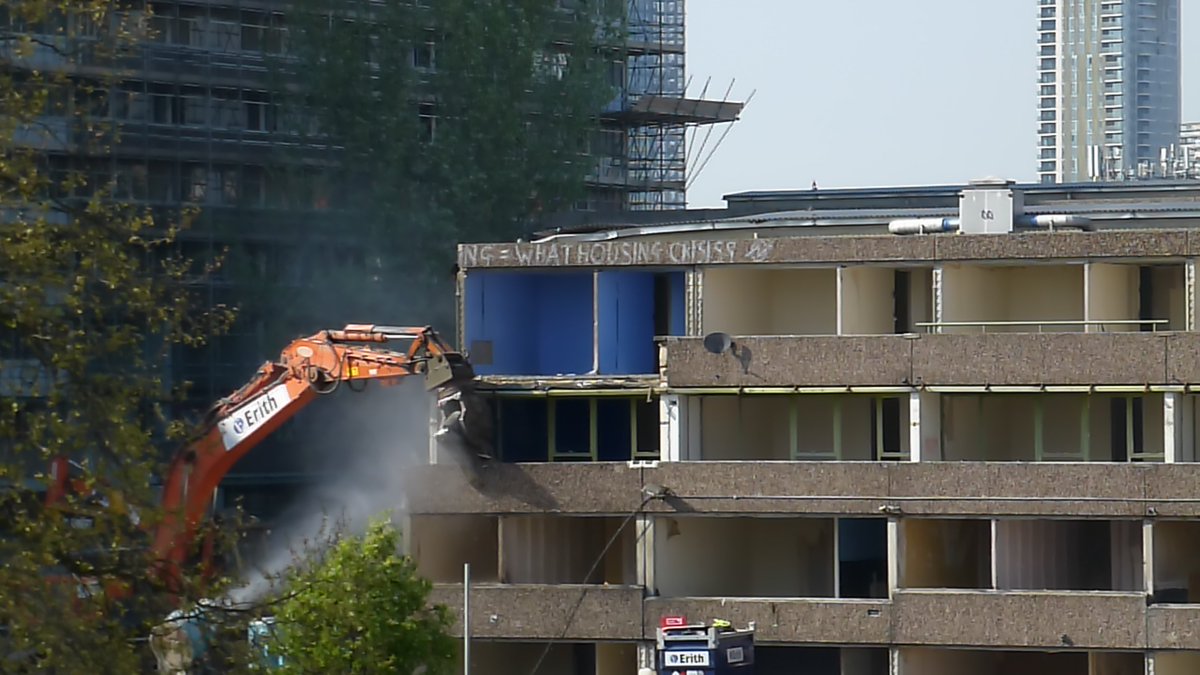
Canada Water redevelopment
In 2018, Peter John signed off the sale of 15 hectares of council-owned land at Canada Water to developer British Land.
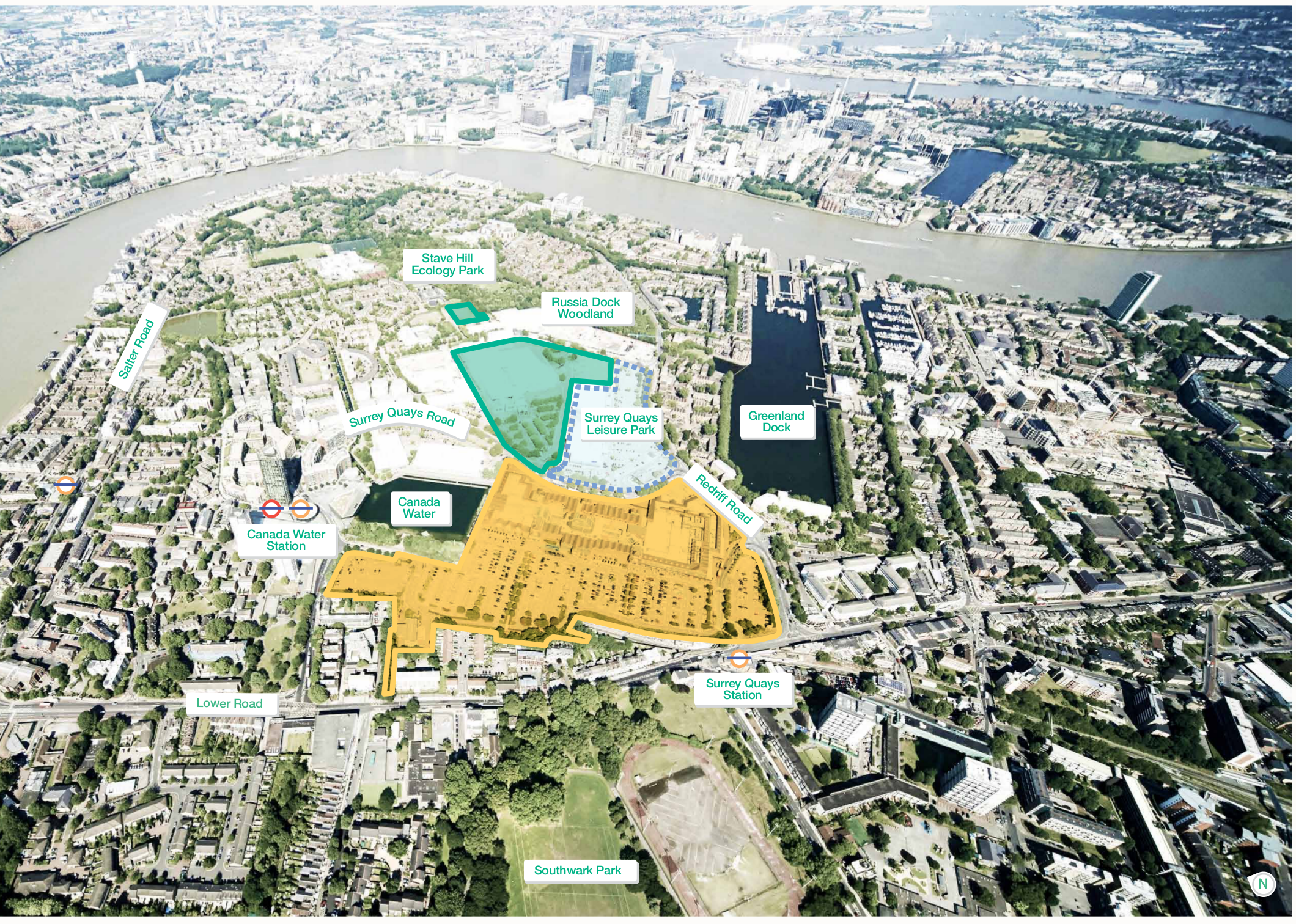
The deal secured 35% affordable housing, but this is below the 50% requirement for publicly-owned land, set by the Mayor in his London Plan 2021 (Policy H4A).
It is unknown what land receipts (if any) the Council will receive in return for its 15 hectares, because the development agreement with British Land has been heavily redacted.

Elephant & Castle shopping centre
Also in 2018, Cllr John took the unusual step of announcing his support for Delancey's proposed redevelopment of the shopping centre despite it having been knocked-back by the planning committee earlier in the year. Amongst other things, the scheme, while exceeding density limits, didn't meet minimum social rented housing requirements, or offer any relocation support to existing traders.
It was only after a concerted local campaign (leading to legal action) that Delancey improved its offer from 33 to 116 social rented homes and agreed to provide relocation units and financial support for some of the traders.

Southwark also boosted Delancey by adopting Compulsory Purchase Order (CPO) powers to help clear the site of traders. This little-publicised power gives local authorities a great deal of legitimate leverage in its negotiations with developers; if a site is not empty, it cannot be developed. But rather than use the power to get a better deal for traders, it stood behind Delancey, whose own hand was strengthened at the traders' expense.
Letting developers off the hook
Aside from the shopping centre, Delancey has also been involved in other schemes in the borough, including Elephant Central (formerly Elephant One), with 272 student rooms and 374 private residences and 185 Park Street (next to Tate Modern) with 69 new homes - neither development has any social rented housing.
These schemes are not exceptions. Our research shows that only 456 new homes, out of 11,863 units in 25 major developments, approved in Southwark from 2006 to 2016 were social rented tenure - 3.8%. Had these schemes to complied with minimum policy requirements then around 2,500 social rented homes would have been delivered in total.
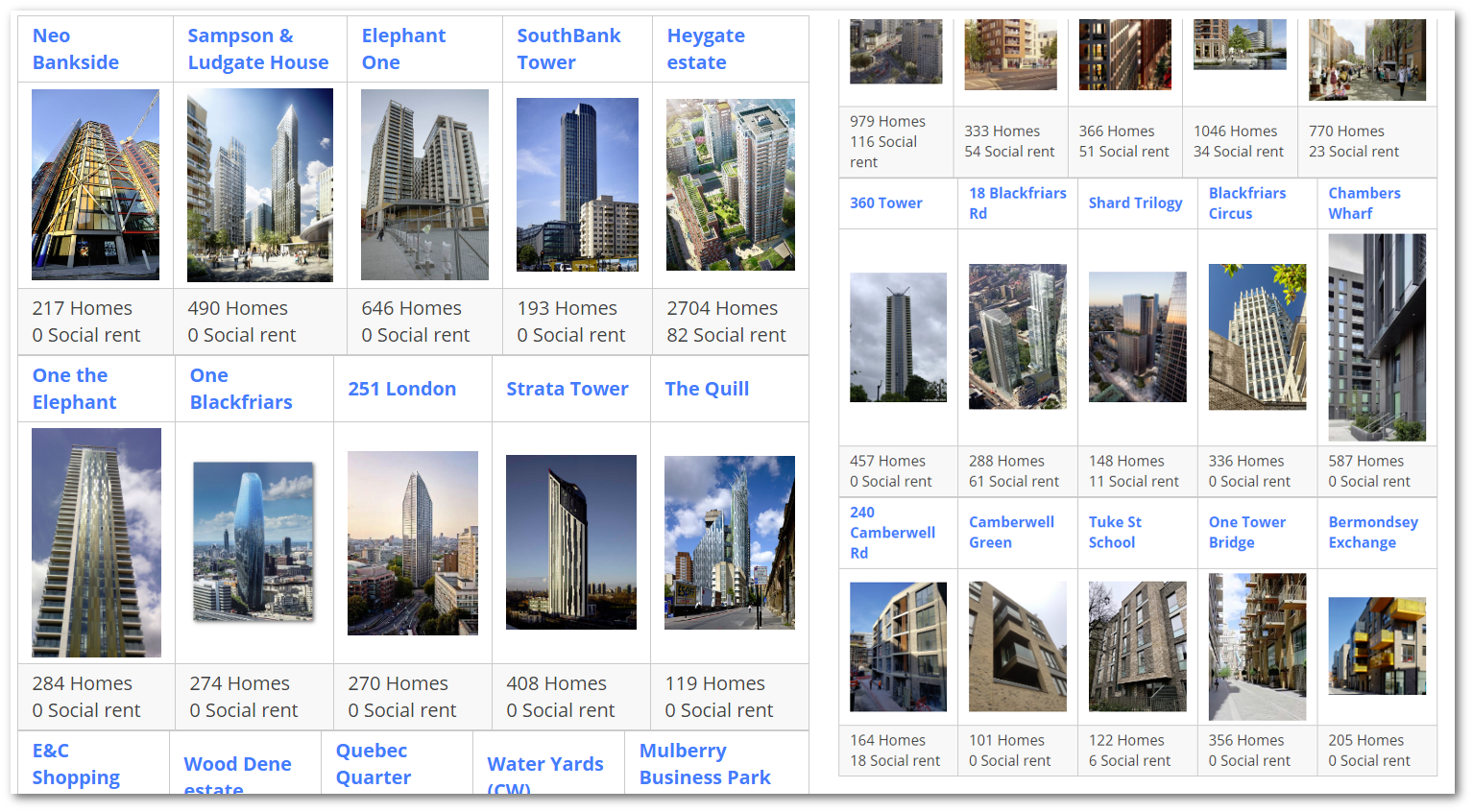
What we say
Confidence in the planning system has been badly dented by high profile schemes not delivering the affordable housing we need. That confidence is not improved when the former leader of the council becomes the chair of a lobbying firm whose business is 'influencing government', including 'public authorities', such as councils.
The Terrapin Group boasts that it is a 'market leader' and has 'a superb track record of helping our clients achieve successful planning consents right across Greater London' and invites inquiries for 'potential assignments'.
We cannot know for whether any of the developments featured above are examples of such successful 'assignments'. More recent developments, such as along the Old Kent Rd, have at least 35% affordable housing, most social rented and so it looks as if the current administration may not be cut from quite the same cloth as the previous one. Notwistanding this, it remains a fact that five sitting Labour councillors (including Cllr John) currently also sit on the payroll of property lobbyists.
If Southwark's new administration wants to clean up its act it could start by taking two simple and immediate measures;
No sitting councillor should also work for a public affairs company whose clients are property developers and investors. It is not enough that councillors do not engage in such work within their own borough, as required by the Public Affairs Code. They should not be trying to persuade fellow councillors in other boroughs to approve schemes either. Planning decisions must be seen to made solely on the merits of the application, with all discussions open to public view.
A local register of public affairs companies for the borough should be established. Every applicant for at least major schemes should be required to list their agents, including public affairs companies.
These measures would not only help maintain the integrity of the planning system, but might also avoid damaging headlines like this one, this one, or this one:
